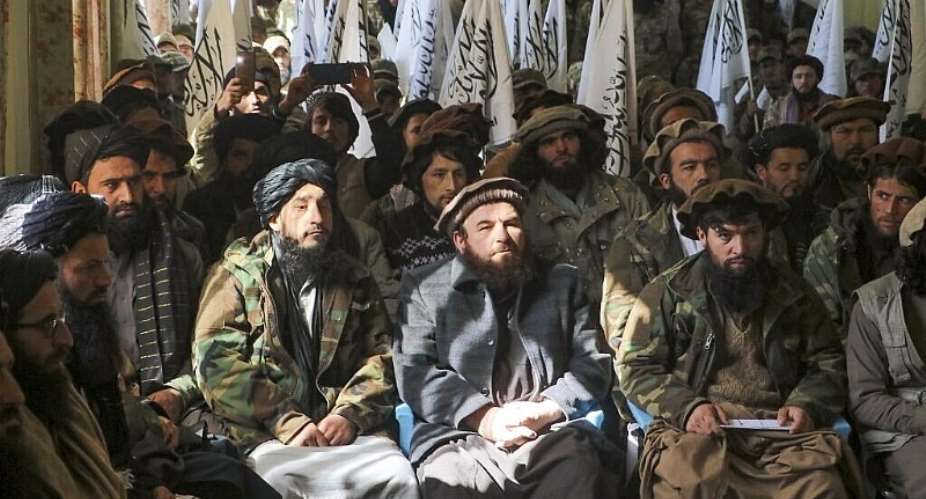Taliban leaders in Afghanistan have taken part in an online course on Indian culture, diplomacy and business suggesting New Delhi is keen to engage with the Islamic militia that seized Kabul in 2021. But Delhi argues the fully online syllabus was free of cost and not exclusively aimed at the Taliban.
The course would provide a “deeper grasp” of Indian business, environment, culture, history, leadership insights, consumer mindsets and regulatory ecosystem, the India Technical and Economic Cooperation Program (ITEC) said on its website.
India's foreign ministry-backed ITEC hosts such programmes in 161 countries and said the four-day course that began Tuesday was crafted by the elite Indian Institute of Management in the southern city of Kozhikode.
Taliban line up
Kabul selected 18 Afghan diplomats; officials said they were screened from a group of personnel who responded to a recent Taliban circular asking eligible workers to line up for the programme.
ITEC had fixed a quota of 30 participants, including business leaders, executives and entrepreneurs for the crowded sessions.
Indian foreign ministry spokesman Arindam Bagchi dismissed speculation that the invitation had gone out only to the Taliban from his government or any of its entities in Delhi.
The programme was open to students "around the world, including in Afghanistan," he said.
Friend or foe?
Bagchi also refuted any shift in Delhi's stand on the Taliban, which last year sparked off worldwide outrage after it banned four Afghan universities from enlisting women students already excluded from secondary school education.
"India has been extending capacity-building assistance to developing countries across the world through the ITEC programme and this includes online courses," Bagchi told a press conference in Delhi.
"These courses are also open to nationals of various countries, including Afghanistan; a number of Afghan nationals, both based in India as well as in Afghanistan, have been participating in these ITEC courses.”
Indian media ANI reported that the Indian embassy in Kabul had offered details of the course to the Taliban in an informal message.
The Indian side "does not issue any note verbales [diplomatic note] to any entities that are not recognised by New Delhi,” Bagchi said.
Humanitarian aid
India does not recognise the Taliban regime and shut its Kabul embassy in 2021. It reopened the mission with skeletal staff a year later after sending emergency wheat supplies to the food-starved nation.
Prime Minister Narendra Modi's government has joined five central Asian countries demanding: “Afghanistan should not be used for sheltering, training, planning or financing any terrorist acts."
Their UN-endorsed joint statement even called for a "truly inclusive" political structure in Kabul and said it must respect the rights of the Afghan people, including women and minorities.
In February 2022, some 80 Afghan cadets from Indian military schools were allowed to stay on for a year and learn English under the ITEC program rather than returning home to an uncertain future.
Since 2001, India has spent 2.8 billion euros through a number of projects; it also sent considerable aid following last year's earthquake as well as Covid-19 vaccines, to stay ahead of arch-rival Pakistan in Afghanistan.
India is home to more than 15,000 UN-registered Afghan refugees. It unveiled an emergency visa to cope with a swell in new arrivals following the Taliban takeover.
Hundreds more, who are not registered with the UN High Commissioner for Refugees, say they are waiting for the opportunity and means to head to the West.
New Delhi turns a blind eye to their illegal status.





 'Kill whoever will rig Ejisu by-election' – Independent Candidate supporters inv...
'Kill whoever will rig Ejisu by-election' – Independent Candidate supporters inv...
 Ashanti Region: ‘Apologize to me for claiming I owe electricity bills else... – ...
Ashanti Region: ‘Apologize to me for claiming I owe electricity bills else... – ...
 Ghana is a mess; citizens will stand for their party even if they’re dying — Kof...
Ghana is a mess; citizens will stand for their party even if they’re dying — Kof...
 Internet shutdown an abuse of human rights — CSOs to gov't
Internet shutdown an abuse of human rights — CSOs to gov't
 Free SHS policy: Eating Tom Brown in the morning, afternoon, evening will be a t...
Free SHS policy: Eating Tom Brown in the morning, afternoon, evening will be a t...
 Dumsor: A British energy expert 'lied' Ghanaians, causing us to abandon energy p...
Dumsor: A British energy expert 'lied' Ghanaians, causing us to abandon energy p...
 What a speech! — Imani Africa boss reacts to Prof. Opoku Agyemang’s presentation
What a speech! — Imani Africa boss reacts to Prof. Opoku Agyemang’s presentation
 Dumsor: Tell us the truth — Atik Mohammed to ECG
Dumsor: Tell us the truth — Atik Mohammed to ECG
 Dumsor: Don't rush to demand timetable; the problem may be temporary — Atik Moha...
Dumsor: Don't rush to demand timetable; the problem may be temporary — Atik Moha...
 Space X Starlink’s satellite broadband approved in Ghana — NCA
Space X Starlink’s satellite broadband approved in Ghana — NCA
